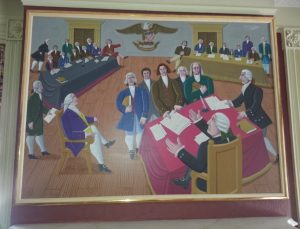
“Declaration of Independence,” by Oscar de Mejo (1911-1992)
The June 29 issue of the Savannah (Georgia) Morning News published an op-ed on the Declaration of Independence, co-authored by H. Lee Cheek, Senior Fellow, The Alexander Hamilton Institute for the Study of Western Civilization (AHI). Cheek and Sean Busick, Professor of Political Science, Athens State University in Alabama, ask “Professors: As We Celebrate Independence, Let’s Take the Declaration Seriously.”
Cheek and Busick examine the meaning of the Declaration in historical context. “July 4, 1776,” they note, “was neither the beginning of the War of Independence nor the date on which our independence was secured.” The Declaration explained to the world the grievances that justified the separation of thirteen British colonies from their ties to King George III. The declaration established a union of thirteen states equal to each other in their assertion of a corporate sovereignty.
“Drafted in stages from 1776 to 1777, the Articles [of Confederation],” the authors maintain “extended and revised the Declaration’s defense of local and state authority, and the delineation of state autonomy, while establishing popular rule based upon the deliberative, decentralized, community-centered participation of the citizenry.” Despite abuse by both politicians and activists in the guise of scholars, this “grand document remains a fundamental American defense of civil liberties and diffused power that our leaders in Washington and the professorate cannot ignore.”

Leave A Comment